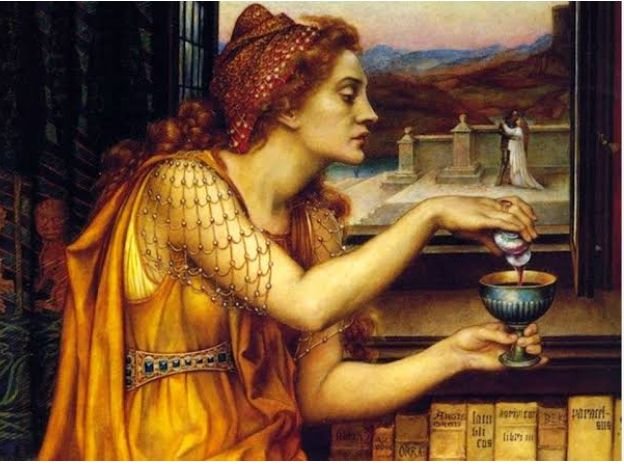See the 17th Century Serum that Killed Hundreds of Husbands in Europe
Do you know that during the 17th century in Europe, hundreds of husbands died mysteriously? In the 1600s, many Italians housewives had no hope of escaping bad marriages. So hundreds of them turned to poison to kill their husbands and to collect their inheritance. So what really is serum and how deadly was it? This is what this classic post will be discussing here.

What then is Aqua Tofana?
Aqua Tofana was a deadly strong poison created in Sicily around the year 1630 that was reputedly widely used in Palermo, Naples, Perugia, and Rome, Italy. It has been associated with Giulia Tofana, or Tofania, a woman from Palermo, purportedly the leader of a ring of six prisoners in Rome, who sold Aqua Tofana to would-be widows.
The deadly poison Aqua Tofana came in a pretty bottle. It was colourless, odorless, and tasteless for almost 20 years in 17th – century Italy, hundreds of women used it to stealthily kill their husbands.
Their motivations may have differed, but the results were the same. The poison worked quickly and quietly and killed without leaving a trace. By the 1650s, its estimated that Aqua Tofana killed some 600 unwanted husbands!
Trending Now: Cement price set to crash in Nigeria
For women living in 17th – Century Italy, marriage could be a cage. They had few options aside from finding a husband, and once they had one, it was impossible to leave. But a woman named Giulia Tofana had a solution.
But who is Guilia Tofana?
Born in Palermo, Italy, around 1620, Giulia Tofana knew a thing or two about death. When she was just 13 years old, a woman named Thofania d’ Amado, possibly Guilia’s Mother, was executed for killing her own husband with poison.
In the aftermath, Tofana carried on her mother’s legacy using her old recipe. She began selling Aqua Tofana, an odorless poison that she disguised as an ointment. Though, the exact concoction has since been lost, Tofana likely made her poison with arsenic, lead, and belladonna.
But what is contained in Aqua Tofana?
Aqua Tofana contained a deadly blend of ingredients. Contains Arsenic, lead, and Belladonna.
Arsenic, found in many women’s cosmetics in the 17th century, could kill in a high enough doses. Lead was equally as deadly.
The final ingredient, belladonna, was also used in small does as a makeup. Women would take the juice from the nightshade’s berries and use it as eye drops to dilate their eyes.
Guilia Tofana established quite the business in Rome, where she hired associates to operate a covert apothecary, to quietly sell their deadly potion among actual cosmetic products.
Soon, men began dying by the dozens as a result of women desperate to leave their unhappy marriages, or collect the inheritance money and begin anew.
For women in the 17th Century era in Italy and Europe, who wanted to relieve themselves of their husbands, Aqua Tofana was the perfect murder weapon.
It came in a simple bottle that they could hide among their toiletries. And it was odorless and tasteless, which meant they could slip it into their husband’s food and drink without him noticing.
The effects of Aqua Tofana caused symptoms similar to cold. A second dose would induce stomach aches, vomiting, and diarrhea. Finally, after a third or fought dose, the victim was at death’s door. For almost two decades, Guilia Tofana quietly sold her poison until one of her customers brought her downfall.
One of Guilia Tofana’s clients decided to use Aqua Tofana to kill her husband. She puts a few drops in his soup and brought it to their table. But when he brought the bowl to his lips, she had a change of heart.
Begging him not to drink the soup, the wife eventually admitted that she’d poisoned it. She then told her husband where she purchased the poison.
Guilia Tofana was then arrested, tortured, and put on trial after she admitted that her poison had killed some 600 people. She and her assosisates were executed, as were a number of her lower-class clients.
However, some of her prominent clients were spared, at the request of the pope.
According to one historian, though, Guilia Tofana might not have met such a gruesome fate after all. Though a poison-ring trial in Rome did happen in 1658, its possible that Gulia Tofana missed it entirely.
Historian Mike Dash of the University of Cambridge has suggested that Tofana died, probably peacefully, and possibly in 1651. He believes her associates and clients stood trial without her.
And finally, the legend of Aqua Tofana and the murderous wives of Rome grew with time. The basic facts of the story are that hundreds of husbands died, by poison sold by a woman, spread through 17th century Europe.
The basic facts of Aqua Tofana are obscured by history, just as it once helped wives to obscure the truth of their husbands’ demise.
SHARE FOR US: if you found this Post useful, help others discover it too. Just click and share using the buttons below!
What's Your Reaction?




















